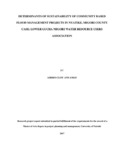| dc.description.abstract | Community based approaches for community development in projects management, have
emerged as the best tools for achieving project sustainability. Project sustainability in flood
management and prevention can be achieved if only change agents can adopt community-based
approaches that embrace participation and involvement of the communities in designing,
planning, implementation, and monitoring and evaluation. The main purpose of the study was to
examine the sustainability of community based flood management projects in Lower Gucha
Migori Water Resource Users Association in Nyatike, Migori County. The specific objectives
were to examine the role of public participation in sustainability of community based flood
management projects, to determine the role of funding in sustainability of community based
flood management projects in Nyatike, to assess the effect of information dissemination in
sustainability of community based flood management projects in Nyatike, and to examine
expertise in sustainability of community based flood management projects in Nyatike, Lower
Gucha Migori Water Resource Users Association, Migori County. This study adopted
descriptive research design. The study target population was key stakeholders in Nyatike, Lower
Gucha Migori Water Resource Users Association who are estimated to be 821. Simple random
sampling technique was used to select 269 respondents as the sample size. The questionnaire was
self-administered through drop and pick from the respondents. Data collected was mainly
quantitative and analyzed by descriptive analysis. The descriptive statistical tools help the
researcher to describe the data and determine the extent to be used. The Data analysis used was
SPSS. The study found that community participation influences sustainability of flood
management projects. The findings indicated that the level of access to information influences
sustainability of community based flood management projects. According to the findings funding
affects sustainability of flood management projects in Nyatike, Migori County. There is need for
adequate funds for implementing of flood management projects according to the designs and
plans. Trained members of Water Resource Users Association are more efficient while operating
the water structures thus minimizes any breakdowns during maintenance or operation. The study
recommends that county leadership and committee members of Lower Gucha Migori Water
Resource Users Association ought to ensure that the major stakeholders are involved in the
community based flood management project to allow them to own the projects. It is also
recommended that Water Resource Users Association should ensure that management
committees are formed and members adequately trained. The researcher acknowledges the fact
that the study was limited to Nyatike, Migori County and not the entire country it is therefore
recommended that further studies be conducted to establish the factors influencing sustainability
of community based flood management projects in other counties. | en_US |



